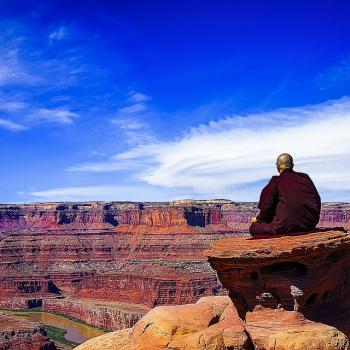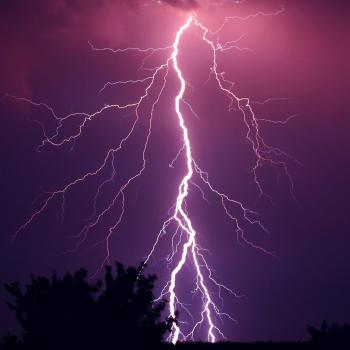(Two notes to begin: 1. Since this will go up January 2 or so depending on the holiday shifts of the Patheos tech elves, A Happy New Year to all readers! 2. While this episode of The Zen Pagan is a defense of Buddhism as I understand it, I remind the reader that I have no formal qualifications on the topic, that these are the opinions of an “outsider Buddhist” at best. Thank you, enjoy the show.)
Over at the NYT philosophy blog “The Stone”, Todd May recently posted a piece titled “Against Invulnerabilty” in which he argues against philosophies that claim that “we can, and we should, make ourselves immune to the world’s vicissitudes.” Central to these philosophies, he says, is the belief “that we can extricate ourselves from the world’s contingencies so that they do not affect us.”
In opposition, May claims that “Most of us want to feel caught up in the world. We want to feel gripped by what we do and those we care about, involved with them, taken up by them. The price of this involvement is our vulnerability.” And to a certain degree I concur with that, as I’ve written before. But I have to take issue with May’s claim that Buddhism teaches the sort of “invulnerability” that he describes.
I’m not sure that Stoicism teaches this the way he claims, either. I’m much less familiar with that philosophy (though I do like to quote a friend’s description of me as “stoic, in a fuzzy sort of way”) but let’s look at the argument that May offers:
Invulnerabilism recommends that we secrete a distance between ourselves and the world so that ultimately it cannot touch us. The extremity of such a view can be illustrated by reference to the Stoic’s ratification of the ancient philosopher Anaxagoras’ reported remark upon hearing of his son’s death: “I always knew that my child was a mortal.” It is possible perhaps that some few among us can reach this degree of distance from the world. But the question is, do we want it?
I don’t know what else Anaxagoras might have said about his son, perhaps some other remarks on the record somewhere indicate that he was a callous or distant parent. But no such conclusion can be reached from this quotation.
Observing that those we care about are mortal is not in any way to distance ourselves from the world. It is the very opposite. It is acceptance of the way the way the world in fact is. That can only bring us closer to reality, closer to the world.
And that is certainly in harmony with the teachings of the Buddha.
The idea that one should seek to distance oneself from the world is expressly refuted in the mythology around the Siddhartha’s enlightenment. This was supposedly the last temptation that Mara, the tempter demon, the Lord of Illusion, offered: after trying to distract the seeking prince with the usual fleshy pleasures, and then trying to scare him off with claims of his unworthiness (which the prince refuted by calling upon the Earth to bear him witness), after Siddhartha had achieved his enlightenment the tempter had one more trick up his sleeve: “Yes, oh Prince, you have reached highest perfect enlightenment, and good for you. But think of how hard it was to get here! Only a truly extraordinary individual like yourself could ever achieve such a thing. If you go back and start trying to preach to the rabble, if you try to teach others, no one will understand you and you’ll just end up disappointed. Why don’t you just stay here, soaking in your enlightenment?”
The Big B, remember, had already mastered his human desires to the utmost degree. He had almost died from extreme ascetic practices. Had he decided to just keep sitting under that tree in perfect meditative bliss, detached and distant from the world, until his body gave out, he could certainly have done so.
He had the ability to completely distance himself from the world.
But he didn’t.
He told Mara, “Some will understand.” And he came back to the world of everyday human society. He preached and he taught, and he dealt with the jealousy of the leaders of other sects, and he survived several assassination attempts, and he dealt with the petty day-to-day matters of running a community of monks, and he got his hands dirty (figuratively) trying to deal with his society’s classism (in the caste system) and sexism, and got his hands dirty (literally) taking care of sick monks.
To claim that the Buddha was “distant” from the world is a terrible misunderstanding of what he did and taught.
Now, the Buddha’s wisdom does begin with accepting the world as it is, and this acceptance of the way things are leads us to the understanding that things are often not the way that we desire them to be, a situation called “dukkha” — often translated as “suffering” but other have suggested that “stress” or “disjointedness” might be more accurate.
Let’s look at an example of this that May uses. As a native New Yorker, he feels a “foreigner” in suburban South Carolina:
Sometimes I tell myself that my life is certainly far better here than most other lives on the planet. And this is certainly true. But it rarely seems to me to be helpful in those periods where I feel an exile. Instead, it leads more to an attitude of “it’s bad for almost everyone, except the lucky few.” That hardly counts as wisdom, and does little to comfort me. But suppose I think of it differently. Life is contingent. The very same trajectory that led me to South Carolina also gave me my family, my opportunity to study philosophy, many of the friends I have and much else.
Consoling oneself with thoughts of how we have balanced the pleasant with the unpleasant may give some comfort. And there’s nothing wrong with that. But it’s a shallow practice and so the relief will likely be short-lived.
I don’t have qualifications to give May any “official” Buddhist advice about his feelings of exile. But if I were to fake it, rather than advising him to distract or console himself with thoughts of how other factors make up for that unpleasantness, I’d advise him to sit with that unpleasantness for a while. Really look at it. Accept its existence. See what it’s made of. He might find that most of his feelings about it are self-generated drama. With some practice and some time, he might discover that the “New York” that he yearns for is not anything based on his actual experiences of the city, but that he’s in love with a mental projection, an advertising campaign about how New York is. Maybe that seemingly solid feeling is actually hollow. It might just pop like a soap bubble.
Or maybe he would find that his love of the hustle and bustle of New York is solid, that he will always be unhappy without the noise, the crowds, the energy, the art, the diversity, the smell of urine in the subways. Perhaps its his attachment to his career and to his South Carolina suburban social circle, to leading the “right sort” of professional life as he’d imagined it, that would pop like a soap bubble.
What we find in pursuing the Eightfold Path is not invulnerability or distance from the world, but rather a better idea of our true connection. That’s why the mythology of Mahayana Buddhism is packed with compassionate Bodhisattvas who hear the cries of the world. But if you would do good in this world you must act from a place of calm and from clear sight, from acceptance of the world as it is — and of acceptance of yourself as you are.
“The Zen Pagan” appears every other Friday. You can keep up by subscribing via RSS or e-mail.
If you do Facebook, you might choose to join a group on “Zen Paganism” I’ve set up there. And don’t forget to “like” Patheos Pagan over there, too.














